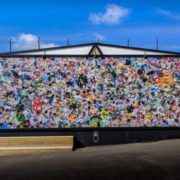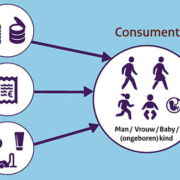What’s the deal with the Plastic Soup again?
March 15 2024 That’s what readers of news site nu.nl on their comment platform Nujij were wondering. In a recent […]
They are no standard holiday souvenirs that Maria Westerbos has brought from Honduras. A small plastic elephant without a trunk and a torn off leg of a Barbie doll – once baby pink and presumably subject of warm affection. Now a homeless and dirty piece of plastic, blackened, stained, scratched and smelly. How long these toys have been travelling, and via which route, before Maria picked them from the beach on Roatan? Only heaven knows. Now they are on her desk in Amsterdam, as silent witnesses of the plastic disaster which takes place in the seas and along coastlines worldwide.
A JOURNEY WITH A PURPOSE
The founder and Director of the Plastic Soup Foundation has returned from a visit to the Honduran island of Roatán, 8 kilometres wide and 60 kilometres long. She was there together with SodaStream-CEO Daniel Birnbaum and the 150 most senior managers of the company from 45 countries. Maria was keynote speaker and travelled along as the only representative of an NGO, together with filmmaker Chris Jordan (‘Albatross’) and an international group consisting of some twenty influencers and journalists.
The entire top layer of the Israeli company – which sells devices that convert tap water into sparkling water in an instant – flying to specifically this tropical island, was not without reason. “Daniel had a clear purpose, he wants his company to make a big change, away from disposable plastics,” says Maria. “That was also the reason I responded to this invitation. If such a big company is undergoing a radical change of direction, it is important that all your managers understand why. He wanted to confront them with all plastic junk that washes ashore on such a remote island every day. He wanted to clean up together with them, and that is what we did, joined by local school children. A few days in a row we got up between 5 and 6 o’clock in the morning, when the temperature was still reasonably comfortable. By 10 a.m. the temperature had already risen to 45 degrees.”
There was no stopping it, the plastic just kept coming. Large recognizable plastic objects such as a fan and the brush of a broom, but also flip flops, dolls, bottles, cans and especially numerous, multi-coloured plastic particles that can no longer be cleaned up by hand. The leaflets may still describe Roatán as Paradise Island, the island is now especially burdened by waste.
“There is no waste management on the island, nothing. I saw football pitches covered with waste and children playing football around it. I saw piles of rubbish in back yards of houses, where it is dumped and occasionally set on fire. You can see the traces of burning. People throw it down this way, because no provisions have been made. Wherever you look, you see waste. Only at the homes of the superrich you can see that cleaning has been done. But also this waste ends up on large heaps along the coast line and is sooner or later carried away by the sea. That sight of all that waste hit me tremendously. I thought: If the same happens on all those islands in the world that have no waste management, all that waste that has nowhere to go, these small paradises will literally choke on waste and plastic soup. And add to this all the waste the wind blows onto the coasts and is washed ashore from god-knows-where. It made me very sad. And it also made me combative, that is the way it works with me. Worldwide, many more people at each level need to become infected, put their heels in the plastic soup and say: this far and no further.”
PLASTIC TOO DIRTY FOR RECYCLING
The island is completely surrounded by water and indeed receives the waste as a gift from all directions, from the entire Caribbean, from Guatemala, Belize and Mexico in the West and from Cuba and Haiti in the Northeast. “All drains flow directly into the water. At one point I sank away into the poop and plastic soup until halfway my calves. Oh Maria, I thought, when I struggled forward on my slippers: this can easily give you infections. If this is our future, if all bounty islands look like this or will look like this any time soon, then both humans and the ocean are at great risk. Earlier I have seen the plastic soup wash ashore on Hawaii and on the beaches in Vietnam, I have seen it float in the dead Bagmati River in Kathmandu high in the Himalayas, but to see such a small habitat in the middle of the ocean or here in the Caribbean Sea collapse under plastic trash, is certainly enough to make one weep.”
“It is therefore very interesting to see how SodaStream turns its managers into an army of plastic fighters. Yes, that was printed on the t-shirts they all wore. I found it a special experience to see how much serious dedication there is. The ambitions are high. On the closing night I heard Daniel Birnbaum say they want to clean up 95 percent of the plastic soup.”
On Roatán, SodaStream also unveiled and tested the so-called Holy Turtle, a floating system towed between two boats that should filter plastic from the sea. “Even if it works, you still face the problem what to do with the waste after you have taken it out of the water. If there is no waste management system nearby, you need to bring it to the mainland. Recycling is not an option: much plastic from the sea is so polluted that only a fraction of it is reusable. It is a complex problem, it’s not all that easy. But the intention is amazing. Daniel is infected with the same virus that infected me ten years – and many others I am happy to say.”
‘YOU MUST SEE IT WITH YOUR OWN EYES’
What made the difference for the SodaStream top executive? “He told me that he had seen many videos and pictures of the plastic misery on beaches. Then he flew to the island a few months ago to take a look. Just calculate the cost of flying 200 people to such a remote island and rent an entire resort. But if you can transfer the virus to your managers and can explain to them why you think their company must take its responsibility, then it’s terribly effective. You have to see it with your own eyes! Some companies fish for plastic in the canals of Amsterdam, which is also good. But I think that many more companies should make the same type of journey as SodaStream did. You could compare it with Bernice Notenboom who’s going to the melting Arctic with captains of industry. I would like to do something similar myself, to show CEO’s what we all do together. We are the only animal in the world that soils its own nest, with deadly results.”
“Daniel and I share that insane ambition to clean up the plastic and fix the problem. To save the world! But if you have that ambition, then, gradually, also come the disappointments. If SodaStream is serious about structurally working with us, if you want to make a difference, then it always starts with yourself. You have to begin with the approach at the source. So that is why I say: SodaStream, go on a plastic diet. Reduce your Plastic Mass Index: your PMI. We can help you with that. You need to make a plan: take the plastic out of your packaging, remove the plastic from around your packaging, replace all your plastic bottles within a couple of years. Yes, now they still have glass and plastic bottles that consumers can refill. In term, SodaStream will therefore have to dispose of those plastic bottles. The caps are also made of plastic. If you want to be a Plastic Fighter, you have to put yourself on a plastic diet. And your customers too. Actually, we all need to go on a plastic diet! We have worked hard on this concept in 2018.”
‘WE WILL GO ON A PLASTIC DIET, SO WILL YOU’
SodaStream has generously donated $10,000 to the Plastic Soup Foundation. “That is very important to us. We will use it for the ‘plastic diet for consumers’ web application that sets out to make ‘losing plastic weight’ fun and attractive. We will then also integrate the diet in an app that keeps track of where you are, so that you never can fall back. I see a nice cooperation ahead: campaigning on the plastic diet together. SodaStream saying to its consumers worldwide: ‘we are going on plastic diet, so will you! And use this app.’ Such a message can reach very many people worldwide. That is a unique proposition, it will make you stand out.”
To what extent the recently announced billion-dollar take-over of SodaStream by PepsiCo affects the plastic-free ambitions of the Israeli group, is yet to be seen. Maria sees opportunities. “The CEO of PepsiCo also visited the island, when we were there. I have the impression that Pepsi wishes to do something. But if you look at the worldwide data of World Cleanup Day, they stand cheerfully side-by-side with Coca-Cola. PepsiCo is one of the biggest polluters. It is of course a super tanker and it is particularly hard for such a huge company to change course. In comparison, SodaStream is a speedboat. SodaStream is to remain independent, so is the agreement and the intention. Maybe SodaStream can set the correct example which PepsiCo can follow and examine what they can do to tighten the single-use plastics tap. That would be fantastic.”
March 15 2024 That’s what readers of news site nu.nl on their comment platform Nujij were wondering. In a recent […]
The first Impact Fair is Europe’s largest Impact Experience. An interactive ‘immersive’ experience of impactful examples.
The waste-export to countries outside of the EU has been restricted The Netherlands is against a carpet ban on shipping of plastic waste.
The waste-export to countries outside of the EU has been restricted The Netherlands is against a carpet ban on shipping of plastic waste.

 Plasticizers in plastic slow down baby’s language development
Plasticizers in plastic slow down baby’s language development